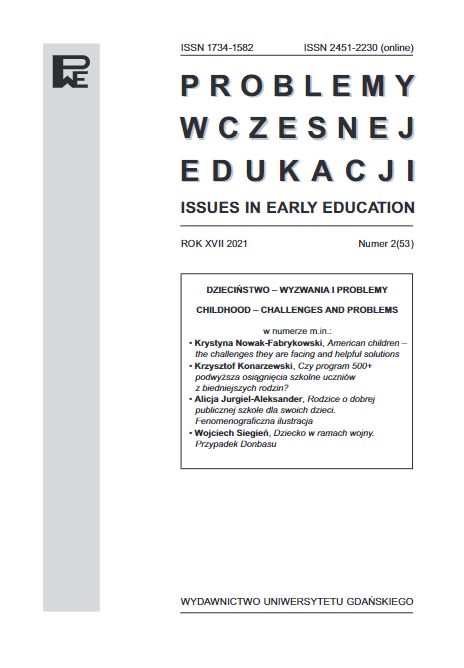Digital skills of pupils aged 6–9 – children’s and adults’ perspective
DOI:
https://doi.org/10.26881/pwe.2021.53.05Słowa kluczowe:
kompetencje cyfrowe, umiejętności cyfrowe, wczesna edukacja, edukacja medialnaAbstrakt
In this article, I presented the results of the research aimed at identifying how early school age children create their digital skills. Despite the fact that the topic of digital skills seems to be an empirically well-recognized area, there is still relatively little research on children aged 6–9 years. I presented the conducted research both from the perspective of a child and an adult: digital experts and teachers. I conducted both qualitative research (in-depth interview with thirty children and ten digital experts) and quantitative research (survey with 717 teachers). Such a confrontation of three perspectives allowed for a full view of the digital world of the child. The research showed the thinking community of children and digital experts, and the opposing (in many aspects) early childhood education teacher’s way of thinking.
Downloads
Bibliografia
Bers M.U. (2012), Designing digital experiences for positive youth development: From playpen to playground. Oxford, Oxford University Press.
Brennan K.A. (2013), Best of both worlds: issues of structure and agency in computational creation, in and out of school. https://scholar.harvard.edu/kbrennan/publications/best-both-worlds-issuesstructure-and-agency-computational-creation-and-out, 10.08.2021.
Brzezińska A., Rycielska L. (2009), Tutoring jako czynnik rozwoju ucznia i nauczyciela. In: P. Czekierda i in. (red.), Tutoring w szkole – między teorią a praktyką zmiany edukacyjnej. Wrocław, Towarzystwo Edukacji Otwartej.
Dolata R. (2009), Szkoła – segregacje – nierówności. Warszawa, Wydawnictwa Uniwersytetu Warszawskiego.
Gasser U., Cortesi S. (2017), Children’s rights and digital technologies: Introduction to the discourse and some meta-observations. In: M.D. Ruck, M. Peterson-Badali, M. Freeman (eds.), Handbook of children’s rights: Global and multidisciplinary perspectives.
Haddon L., Cino D., Doyle M.A., Livingstone S., Mascheroni G., Stoilova M. (2020), Children’s and young people’s digital skills: a systematic evidence review. Zenodo. http://doi.org/10.5281/zenodo.4274654, 9.10.2021.
International Telecommunication Union (ITU) (2018), Measuring the Information Society report. Vol. 1. Geneva, ITU Publications. https://www.itu.int/en/ITU-D/Statistics/Pages/publications/misr2018.aspx, 9.10.2021.
Iwanicka A. (2020), Cyfrowy świat dzieci we wczesnym dzieci szkolnym. Uwarunkowania korzystania z nowych technologii przez dzieci. Poznań, Wydawnictwo Uniwersytetu im. Adama Mickiewicza.
Klus-Stańska D., Nowicka M. (2005), Sensy i bezsensy edukacji wczesnoszkolnej. Warszawa, Wydawnictwo Szkolne i Pedagogiczne.
Kopecký K., Fernández-Martín F.-D., Szotkowski R., Gómez-García G., Mikulcová K. (2021), Behaviour of Children and Adolescents and the Use of Mobile Phones in Primary Schools in the Czech Republic. “Int. J. Environ. Res. Public Health”, (18). https://doi.org/10.3390/ijerph18168352, 10.08.2021.
Kosno M. (2013), Kompetentny tutor. Znaczenie funkcji zarządzających dla przebiegu tutoringu rówieśniczego. „Psychologia Rozwojowa”, 18(4).
Livingstone S., Haddon L. (2009), Podsumowanie projektu EU Kids Online: Raport końcowy. London, LSE.
Livingstone S., Kirwil L., Ponte C., Staksrud E. (2014), In their own words. What bothers children online? “European Journal Of Communication”, 29(3).
Pyżalski J. (red.) (2019), Internet i jego młodzi twórcy – dobre i złe wiadomości z badań jakościowych. Warszawa, NASK.
Pyżalski J., Zdrodowska A., Tomczyk Ł., Abramczuk K. (2019), Polskie badanie EU Kids Online 2018. Najważniejsze wyniki i wnioski. Poznań, Wydawnictwo Naukowe Uniwersytetu im. Adama Mickiewicza. https://fundacja.orange.pl/files/user_files/EU_Kids_Online_2019_v2.pdf, 10.08.2021.
Tanaś M. (2016), Primum non nocere a internetowa przestrzeń wolności i aktywności nastolatków. W: M. Tanaś (red.), Nastolatki wobec internetu, NASK. Warszawa, Naukowa i Akademicka Sieć Komputerowa.
Tanaś M. (red.) (2016), Nastolatki 3.0. NASK. Warszawa, NASK.
Tomczyk Ł., Srokowski Ł. (2016), Kompetencje w zakresie bezpieczeństwa cyfrowego w polskiej szkole. Raport z badań. Tarnów, Stowarzyszenie Miast w Internecie.
Walter N. (2018), Internetowe wsparcie społeczne. „Interdyscyplinarne Konteksty Pedagogiki Specjalnej”, 23.

 Uniwersyteckie Czasopisma Naukowe
Uniwersyteckie Czasopisma Naukowe





